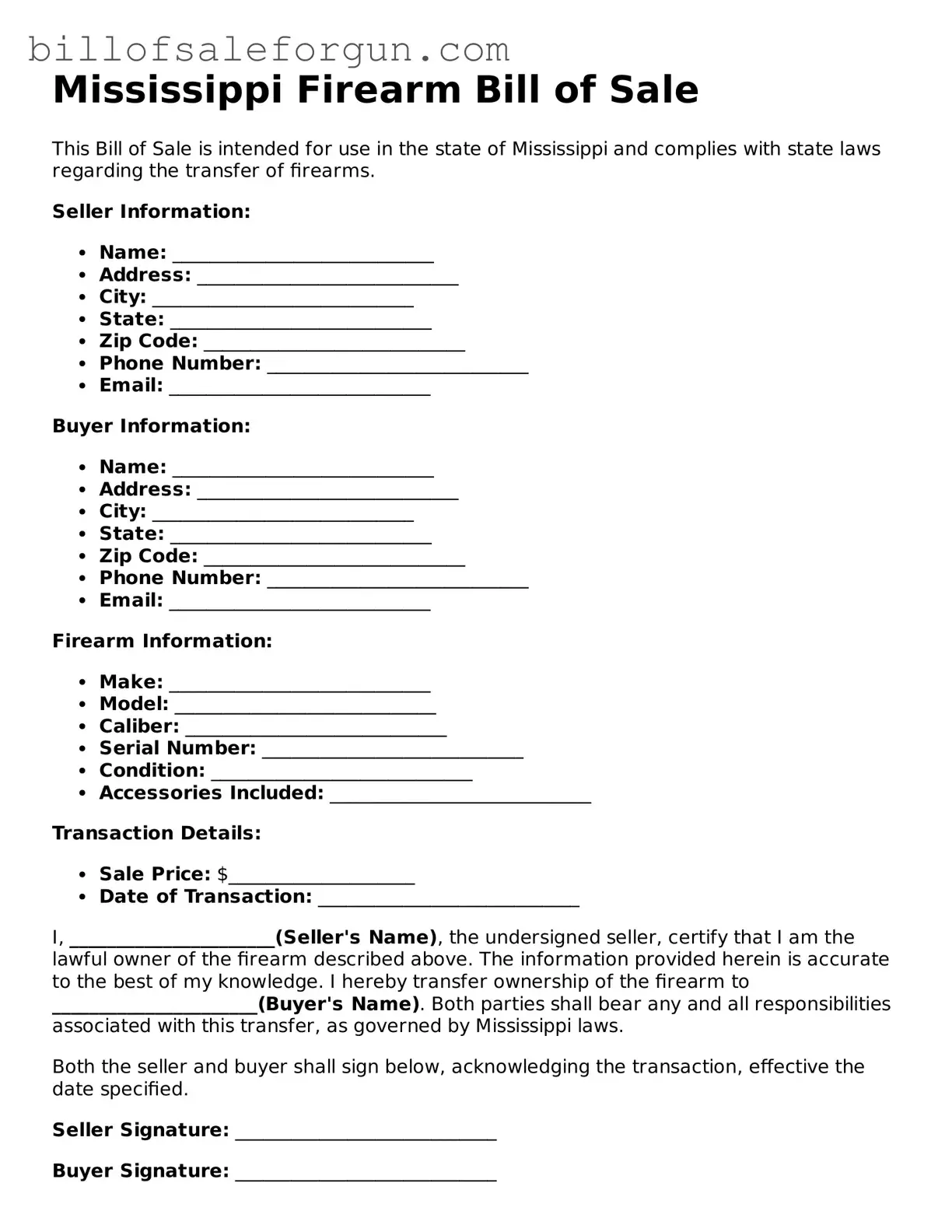Similar forms
The Mississippi Firearm Bill of Sale form shares similarities with the general Bill of Sale, which is a document used in various transactions to transfer ownership of personal property. Like the firearm bill, a general Bill of Sale includes details about the buyer and seller, a description of the item being sold, and the terms of the sale. This document serves as proof of ownership transfer and can be crucial for record-keeping purposes, ensuring that both parties have a clear understanding of the transaction.
Another similar document is the Vehicle Bill of Sale. This form is used when transferring ownership of a motor vehicle. Much like the Firearm Bill of Sale, it includes information about the buyer and seller, the vehicle's identification number, and the sale price. Both documents serve to protect the interests of both parties and provide a legal record of the transaction, which can be important for future reference or in case of disputes.
The Boat Bill of Sale also resembles the Mississippi Firearm Bill of Sale. This document is specifically designed for the sale of watercraft. It includes essential details such as the boat's make, model, and hull identification number, along with the buyer's and seller's information. Both documents function as proof of ownership transfer and help ensure that the transaction is legally binding, providing security for both the buyer and seller.
A Rental Agreement shares some characteristics with the Firearm Bill of Sale, particularly in its need to outline terms and conditions clearly. While the Rental Agreement pertains to the temporary use of property rather than a sale, it often includes details about the parties involved, the item being rented, and the duration of the rental. Both documents require clear communication and mutual consent to avoid misunderstandings and disputes.
When engaging in transactions involving the sale or transfer of property, it is essential to understand the specific requirements and documentation needed, such as the Georgia Att 112 form, which is crucial for wine shipments to comply with state regulations.
The Lease Agreement is another document that bears similarities to the Firearm Bill of Sale. While it typically involves the rental of real estate, it requires a detailed description of the property, terms of payment, and responsibilities of both parties. Like the firearm bill, the Lease Agreement serves as a legal record, protecting the rights of both landlords and tenants in their contractual relationship.
The Employment Contract can also be compared to the Firearm Bill of Sale. This document outlines the terms of employment between an employer and an employee, detailing job responsibilities, compensation, and duration of employment. Both documents require mutual agreement and serve as a formal record of the terms agreed upon, helping to prevent future disputes and ensuring clarity in the relationship.
The Warranty Deed is similar in that it is used to transfer ownership of real property. This document provides a guarantee from the seller that they have the right to sell the property and that it is free of liens or claims. Like the Firearm Bill of Sale, a Warranty Deed is a legally binding document that provides essential information about the parties involved and the property being transferred.
The Power of Attorney document also shares some common elements with the Firearm Bill of Sale. This legal document grants one person the authority to act on behalf of another in legal matters. Both require careful consideration of the parties' identities and intentions, ensuring that the appointed individual has the authority to conduct transactions on behalf of another, similar to how a Bill of Sale facilitates ownership transfer.
Lastly, the Affidavit of Ownership is akin to the Firearm Bill of Sale in that it serves to establish proof of ownership. This document is often used in situations where formal proof of ownership is required but may not have been documented through a sale. Both documents provide a level of assurance regarding ownership and can be crucial in resolving disputes or clarifying ownership rights.
